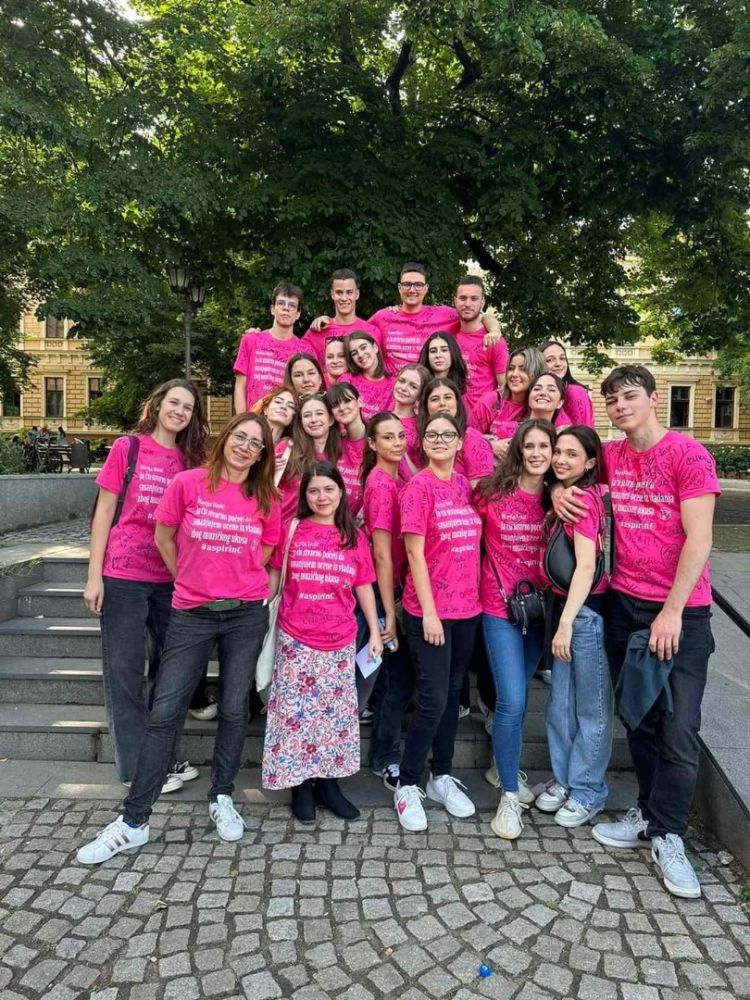Marija in Novi Sad County Jail Klisa

Author: Veran Matić
When I read the message of the son of Marija Vasić, Milan Čanak, on X: “My mother, Marija Vasić, started a hunger strike, a thirst strike at 8 a.m. this morning, refuses therapy and refuses an infusion. In detention in Klisa. She said: “I am asking for release from illegal detention and I will protest against it with my life, because I am not asking for mercy, nor would I give it to you”, after two months of detention and accusations that have no basis in law and on the basis of illegally collected evidence – I understood why the personality of Marija Vasić, professor of sociology at the Jovan Jovanović Zmaj high school in Novi Sad, stands out from all the “slaves” of the prison on Klisa. The true heroes of the protest, in addition to the students, are educators and high school students. Marija Vasić, professor of sociology from the Jova Jovanović Zmaj High School in Novi Sad, is exactly that respectable pedagogue, from a respectable school, behind which every year students enter life with the values they have demonstrated in the past six months.
Moja majka, Marija Vasic,u 8 jutros zapocela strajk gladju, strajk zedju, odbija terapiju i odbija infuziju.
U pritvoru na Klisi.
Porucila je:
“Trazim oslobodjenje nezakonitog pritvora i ja cu svojim zivotom da protestvujem protiv toga, jer milost ne trazim niti bih vam je dala” pic.twitter.com/HrLChRMd7x— Milan Čanak (@MilanCanak) May 13, 2025
I don’t know Maria personally. I know that she wrote two books about the Novi Sad raid and the Holocaust, took part in the filming of the shocking film about the Novi Sad raid “Novi Sad Memory”… At least watch final sequences of it.
NOVI SAD REMEMBRANCE
I asked someone who knows her and got the answer: “I’m afraid she is dead serious about the strike and will go all the way”.
In Marija’s portrait in the newspaper Danas, anti-fascism and participation in the front lines of protests in recent decades are emphasized.
And the message, a quote from the national hero Rade Končar, who, before being shot in 1942, was asked by the executioners if he was asking for pardon: “I am not asking for mercy, nor would I give it to you”, clearly defines the values of this heroine. Marija decided to go on a hunger and thirst strike, ready to give her life against injustice, which is the essence of her engagement.
I know, many have gone on hunger strike, but this is special, I feel. When I asked the famous political prisoner Mihajlo Mihailov (after Djilas in communist Yugoslavia, he spent the most time in prisons), how he managed to always fight for his rights in prison, unlike others, he told me that he always entered the strike ready to go to the end, to the death. And that those who are not ready for it are quickly discovered and thus the strikes fail.
Everything I heard about Marija confirms that she is ready to persevere to the end in the fight for the ideas of freedom and democracy, the rule of law, for the ideas of anti-fascism, as this is a very current struggle today.
And because of that, I don’t think she should be persuaded to stop the strike, as we see in numerous reactions, comments and on social networks. It’s not right. This was also recognized by her students, who told her: “… The material from the subject of sociology, we may forget, but not your personal example of courage, struggle and perseverance. Now we evaluate you. Your grade is 5 with sincere admiration.”
Letter of support from the students of Jovina High School to the teacher who is on hunger strike in detention – News from Serbia, the region and the world – N1 info
This is part of Marija’s lesson from the movie “Novi Sad Remembrance”. And this very class is imprisoned.
…
She made that decision consciously, deeply committed to the ideas she is fighting for. Because what else is left for us if there is no freedom.
In an unfree society, she is also imprisoned in a dungeon. On Klisa. An attempt to humiliate, instill fear. Marija responds in a way that completely destroys those plans and expectations.
And that’s why it’s important that we all start a protest of solidarity with Marija and other political prisoners, in prison or out of prison, in the country or out of the country. It will represent a much greater recognition of Marija’s sacrifice than an appeal to change her important, ethically strong decision, and for the political consistency she practices.
Maria in Defiance
Una, a maiden from a childhood fairy tale,
splash, foam, and whisper to me
about the proud sorrow of Maria’s mother.
And you, wind from the mountaintop, sound off louder
so that I can hear the hearts that are forging revenge
and every night the hearts of my Klekovača comrades
are heard more loudly.
I sing about you, Maria from Kamenica,
the maiden-warrior from the battalion,
who, under Tito’s command, weaved braids
and set out with her heart against the concrete.
I will not sing about Maria the shepherdess,
about jumping from stone to stone,
about the shepherdess-bird, the first ruddy thread in the knot,
nor about her tear, when at dawn they sneak
and hastily flee towards Drvar town,
the people of Kamenica, the workers in Šipad.
I will keep silent about the maiden’s robe
and how sadly the yellow quince smells,
and the dear destined one, not yet seen,
oft appears at the roadside.
Now I see Prkosi, a wind-blown hill,
their nest in our region
and I see Marija in position
in their lairs, in the early dawn,
a field sown with wasps’ nests.
Lightning flashed three times through the night,
three times Marija charged:
When she struck the first bunker
in a lightning that erases life,
she saw her village in flames
and the white flocks that are no more,
she heard an old man speak from a pit
and the wail of a mother with a child in the mountain.
When she charged the second bunker,
she saw the dead paths below Brina
and the ash heap instead of Drvar
and the machines writhing in the fire;
she saw – the column dark and silent
watching over the city that is no more.
And when she dashed towards the third bunker,
death flashed from the dark nest
and broke the falcon’s wings –
a star was torn off over Kamenica.
Her eyes gaze at the last dawn
and the last song from her heart is pouring out:
She began to sing about her first St Elijah’s Day,
when she carried the sacred burden,
gifted her youth to it – as if to a sweetheart;
how in the harsh and frozen dawn,
she held the newborn, the Homeland,
to her untouched chest
and oft’ sang Partizanka to it,
a steely and dewy lullaby.
Maria, the star-lit mother,
whilst the deathly darkness thickens above her –
with her last smile she escorts the warriors:
they carry her child in their arms!
Born in blood, carried in the heart
and carried through three hundred fires.
The brigade marches on, carries the Homeland
and the child grows – a magical fairy tale!
Over him, invisibly, Maria watches
and breathes warmth – a girl and a mother.
*This is a machine translation of the poem with necessary corrections made to communicate the full meaning of the original text.
The author is Branko Ćopić, a well-known Yugoslav writer. The poem is dedicated to Marija Bursać, who was a member of the Yugoslav Partisan resistance movement in World War 2 and the first woman to be posthumously awarded the People’s Hero of Yugoslavia medal in late 1943 while the war was still raging on.


